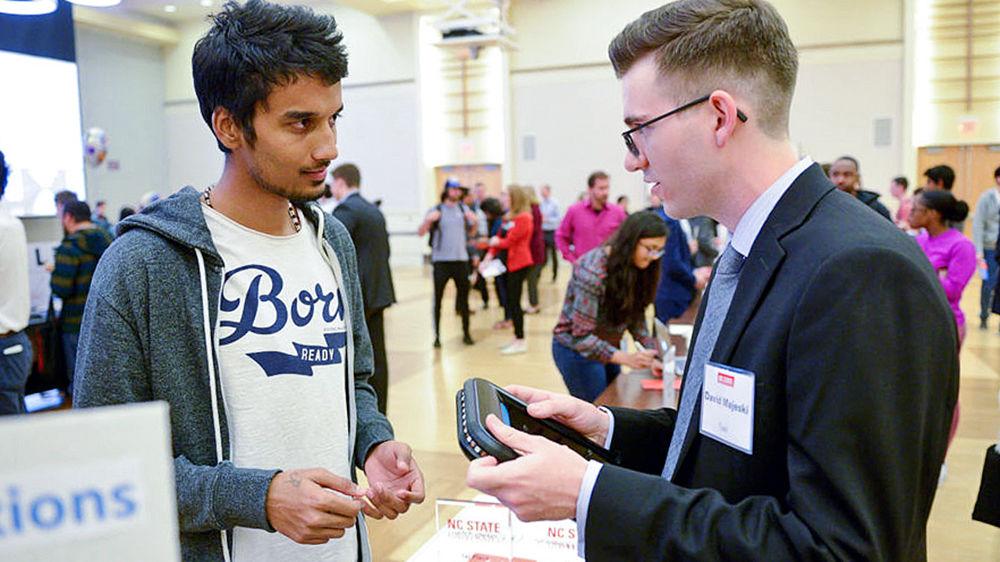
Contributed by Marc Hall
Graduate student David Majeski, right, of Tueri, explains the device to an interested prospect at the eGames Expo.
Earlier this month, the 10th annual Lulu eGames, NC State’s startup competition, awarded over $100,000 dollars in prize money to first, second and third place student winners who have begun to use the money to fund their startups.
Selected by judges from 178 teams and going through two rounds of the competition, the winners in six categories presented their ideas on stage to students, faculty and investors. Macy Thomas, a senior brand manager with NC State’s Entrepreneurship Program, says the competition helps students get their ideas funded.
“That’s really important, especially for students at an early stage,” Thomas said. “They need that few thousand dollars it takes to get their companies off the ground.”
However, according to Thomas, the companies competing at Lulu eGames are more than just entrepreneurial ideas.
“Some of [the students] have paying customers already,” Thomas said. “Some of them have agreements and partnerships. [Lulu eGames is] an interactive way for you to see the different ventures that are coming out of NC State.”
The Daugherty Endowment category, which recognized companies that had licensed NC State technology in the past three years, awarded the first place prize of $25,000 to asthma management company VitalFlo. The second place prize of $15,000 went to Sentinel Biomedical, a company that looks for solutions to canine cancer, and third place went to software company NExS.
VitalFlo, which helps patients predict when asthma attacks will occur, was started last April after the team won $20,000 in the 2017 Lulu eGames.
One of the big winners of the competition, Tueri, a bicycle safety and security device company, took home three awards and earned a total of $16,000. Tueri won first place in the New Venture category as well as in the Design and Prototype category, and the company received the judges’ choice award.
David Majeski, a graduate student studying microbial biotechnology and business and the creator of Tueri, came up with the prototype for the safety device with a group of students in 2016.
“I was hit on a bike twice during my freshman year [of college],” Majeski said. “Even though I wasn’t seriously injured, I stopped biking around campus.”
Majeski continued to work on the device, which is a bicycle headlight, turn signal and brake light attachment that can convert into a bicycle lock.
“Right now, Tueri is a third or fourth priority for me,” Majeksi said, as he is focused primarily on his graduate studies.
However, Majeski says he will continue to develop the safety device that not only improves the security of the bicycle, but also allow cyclists to communicate with motorists on the road.
“I want to develop a true prototype that I can test for durability,” Majeski said after winning at the competition. “I will probably drop it over and over.”
Other big winners of the startup competition included HyPower Solutions and Aeva.
HyPower Solutions, which was created by the same team as Mitramag Canine (the third place winner in the Design and Prototype category), won third place in the Built on a Cloud category and second place in the Design and Prototype category, receiving a total of $5,000. The company created a more efficient method of energy storage by using hydrogen as fuel.
Aeva received $7,000 for second place in the New Venture category. The startup is designing a way for distilleries, wineries and breweries to speed up the aging process of alcohol and increase profits.
Students interested in learning more about the 2018 Lulu eGames can visit NC State’s Entrepreneurship website.